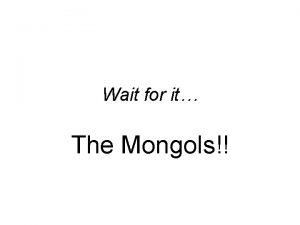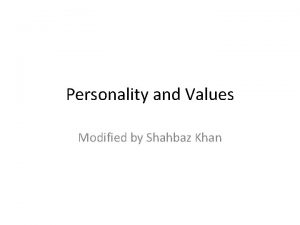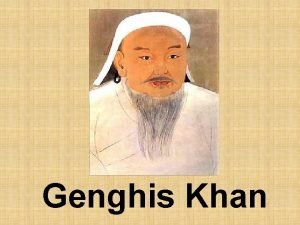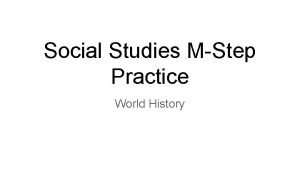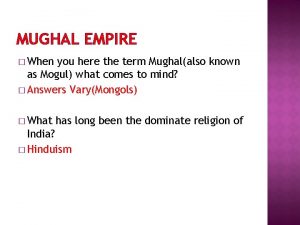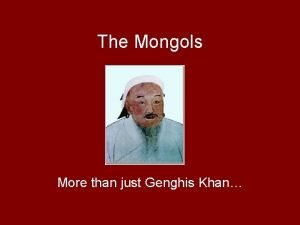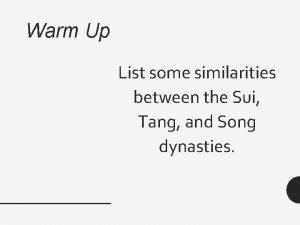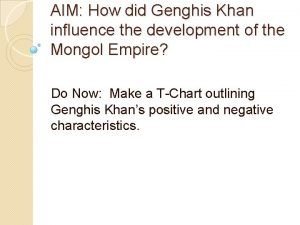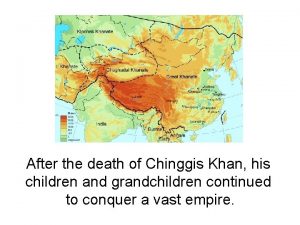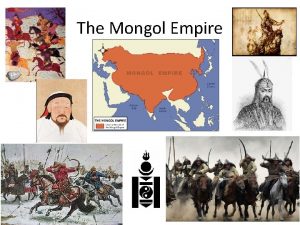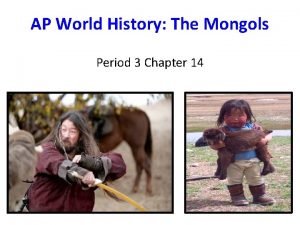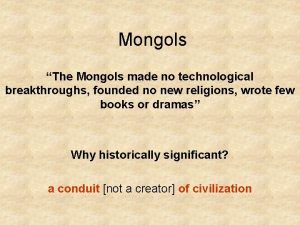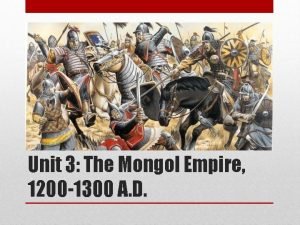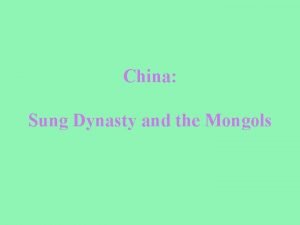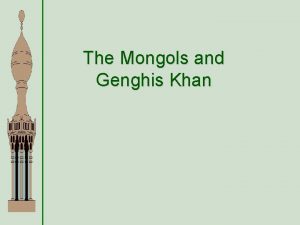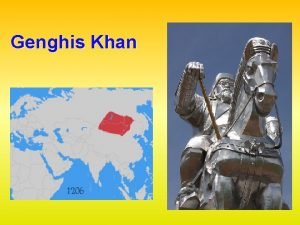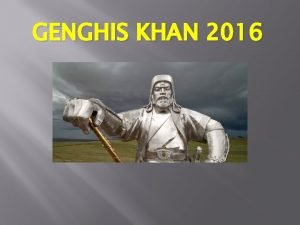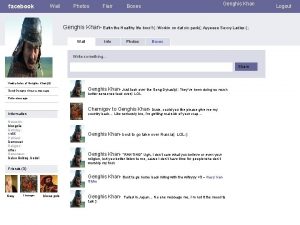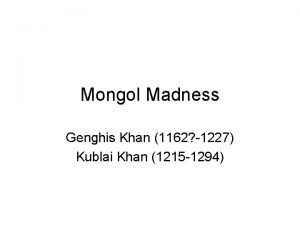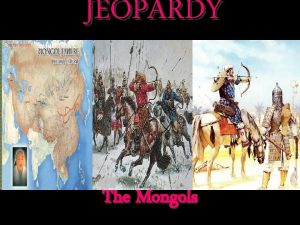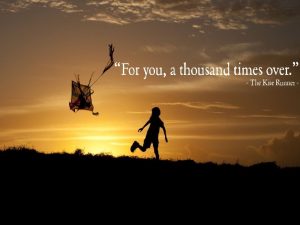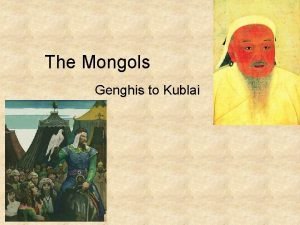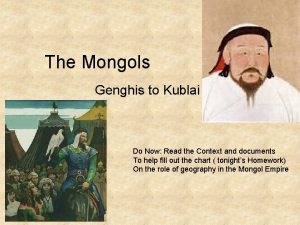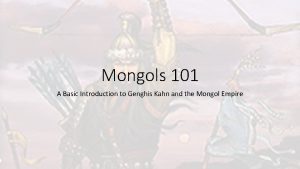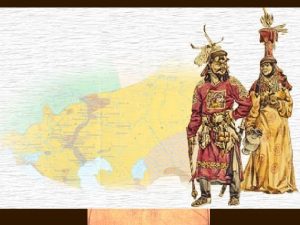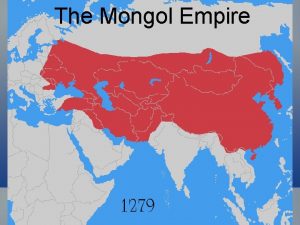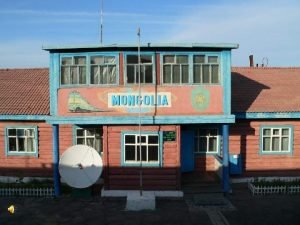Genghis Khan The Mongols The Mongols The Mongols





















- Slides: 21

Genghis Khan & The Mongols

The Mongols � The Mongols are a group of nomadic warrior horsemen from the Asian steppes. � They lived in tribes & were pastoral. � They rose in the 12 th and 13 th centuries and conquered the largest land empire in world history.

steppes

The Mongols � The steppes are vast treeless plains � They are semi-arid � The temperature can vary from -40 degrees to 100+ degrees, and the wind blows fairly consistently at speeds over 15 mph

Mongols http: //people. cs. ubc. ca/~bsd/photos/imgs/Canada/Saskatchewan/ Prarie_Road--North_Saskatchewan. html

The Mongols � The Mongols lived in structures called gers or yurts. � Yurts are portable and strong and withstand the weather on the steppes. http: //afe. easia. columbia. edu/mongols/pastoral/pa storal 9. htm

Mongols � Exploded view of a yurt. http: //www. yurts. com/what/view/d efault. aspx

Mongols � The Mongols herded sheep, and sheep meat, or mutton, and sheep’s milk were the most important part of their diet. � They also used the wool from the sheep, and sheep dung for fuel.

Mongols �Depending on which part of the steppe that they lived on they relied on Camels or Oxen for carting their belongings. �One thing that is constant is their reliance on horses. �Mongols valued their horses and thought they were a gift from the heavens. �They fought on horseback, which was a huge advantage for them militarily.

Mongols � The http: //www. coldsiberia. org/monbow. htg/bow_shoot 1 a. jpg Mongols used the re-curved composite bow. � The bows were small and accurate at a very long range. � Mongol warriors were able to shoot while riding at full speeds at targets with accuracy up to 500 ft away.

Mongols Genghis Khan 1167 -1227 �The most famous Mongolian ruler is Genghis Khan. He was born Temujin, the son of a tribe chieftain who was murdered by a rival clan. �He, his mother and his brothers and sisters were abandoned by the tribe and left to fend for themselves on the steppes. �They had a very difficult life, and Temujin actually killed one of his half-brothers in a fight over sharing food.

Mongols Genghis Khan 1167 -1227 �Before his father died he had arranged a marriage for Temujin to Bortë, a girl from a neighboring friendly tribe. �He and Bortë married at 16. She was kidnapped by a rival tribe, and his efforts to get her back led to him conquering that tribe and many others, until eventually he became the uncontested ruler of all of the Mongol tribes in 1206. �He earned the name Oceanic Ruler or Genghis Khan.

Mongols Genghis Khan 1167 -1227 http: //www. freewebs. com/tavrvs/mongol-empire-large. gif

Mongols Genghis Khan 1167 -1227 �He created the first unified code of law for the Mongols, called the yassa. The rules deal with loyalty, honor, treatment of animals, slavery, liars, adulterers, etc. �He also created a highly structured and organized army, and insisted that all men fight in the army. �He was incredibly religiously tolerant and ordered that religious leaders be treated with respect.

MONGOL 2007

BortË

Landscape

Jamukha

� � � "It is ordered to believe that there is only one God, creator of heaven and earth, who alone gives life and death, riches and poverty as pleases Him-and who has over everything an absolute power Leaders of a religion, preachers, monks, persons who are dedicated to religious practice, the criers of mosques, physicians and those who bathe bodies of the dead are to be freed from public charges. It is forbidden under penalty of death that any one, whoever he be, shall be proclaimed emperor unless he has been elected previously by the princes, khans, officers, and other Mongol nobles in a general council. It is forbidden chieftains of nations and clans subject to the Mongols to hold honorary tiles. Forbidden to ever make peace with a monarch, a prince or a people who have not submitted. The ruling that divides men of the army into tens, hundreds, thousands, and ten thousands is to be maintained. This arrangement serves to raise an army in a short time, and to form the units of commands. The moment a campaign begins, each soldier must receive his arms from the hand of the officer who has them in charge. The soldier must keep them in good order, and have them inspected by his officer before a battle. Forbidden, under death penalty, to pillage the enemy before the general commanding gives permission; but after this permission is given the soldier must have the same opportunity as the officer, and must be allowed to keep what he has carried off, provided he has paid his share to the receiver for the emperor. To keep the men of the army exercised, a great hunt shall be held every winter. On this account, it is forbidden any man of the empire to kill from the month of March to October, deer, bucks, roe-bucks, hares, wild ass and some birds. Forbidden, to cut the throats of animals slain for food; they must be bound, the chest opened and the heart pulled out by the hand of the hunter. It is permitted to eat the blood and entrails of animals-though this was forbidden before now.

(A list of privileges and immunities assured the chieftains and officers of the new empire. ) Every man who does not go to war must work for the empire, without reward, for a certain time. Men guilty of theft of a horse or steer or a thing of equal value will be punished by death and their bodies cut into two parts. For lesser thefts the punishment shall be, according to the value of the thing stolen, a number of blows of a staff-seven, seventeen, twenty-seven, up to seven hundred. But this bodily punishment may be avoided by paying nine times the worth of the thing stolen. No subject of the empire may take a Mongol for servant or slave. Every man, except in rare cases, must join the army. To prevent the flight of alien slaves, it is forbidden to give them asylum, food or clothing, under pain of death. Any man who meets an escaped slave and does not bring him back to his master will be punished in the same manner.

The law of marriage orders that every man shall purchase his wife, and that marriage between the first and second degrees of kinship is forbidden. A man may marry two sisters, or have several concubines. The women should attend to the care of property, buying and selling at their pleasure. Men should occupy themselves only with hunting and war. Children born of slaves are legitimate as the children of wives. The offspring of the first woman shall be honored above other children and shall inherit everything. Adultery is to be punished by death, and those guilty of it may be slain out of hand. If two families wish to be united by marriage and have only young children, the marriage of these children is allowed, if one be a boy and the other a girl. If the children are dead, the marriage contract may still be drawn up. It is forbidden to bathe or wash garments in running water during thunder. Spies, false witnesses, all men given to infamous vices, and sorcerers are condemned to death. Officers and chieftains who fail in their duty, or do not come at the summons of the Khan are to be slain, especially in remote districts. If their offense be less grave, they must come in person before the Khan. "
 Class b 172
Class b 172 Wait for it the mongols
Wait for it the mongols Genghis khan mbti
Genghis khan mbti Temujin name
Temujin name Picture of alliances
Picture of alliances Genghis khan and babur
Genghis khan and babur Kublai khan failures
Kublai khan failures Primordial atrium
Primordial atrium Genghis khan academy
Genghis khan academy Genghis khan gerbil
Genghis khan gerbil Genghis khan dna map
Genghis khan dna map Genghis khan
Genghis khan When did genghis khan rule
When did genghis khan rule Kublai khan children
Kublai khan children Genghis real name
Genghis real name Genghis robot
Genghis robot The mongols in world history
The mongols in world history The mongols made no technological breakthroughs
The mongols made no technological breakthroughs The mongol empire spans eurasia worksheet answer key
The mongol empire spans eurasia worksheet answer key Sung dynasty art
Sung dynasty art Encountering the mongols comparing three cases
Encountering the mongols comparing three cases Mongols in russia ap world history
Mongols in russia ap world history

